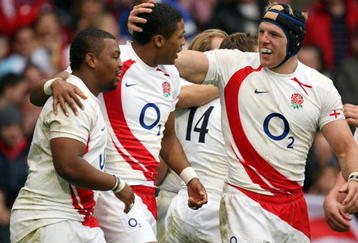
Martin Johnson and his men are having all manner of inquisitions delivered against them. Unfortunately for England, lack of victories is giving their critics endless ammunition, as is the manner of their technique.
Rob Andrew has come out and stated there has been some improvement with England’s performances. On the surface of it, this is true.
The margins of defeat were narrower than they were in 2008, and while some would argue the quality of the opposition may have been stellar, it wasn’t as if it was a first-choice England test XV.
Or was it?
The initial reaction is that if improvement has been made, then where are the wins, or at least, why hasn’t it been evident in the performances on the park? Early rejoinder from the “passionate” England public is that it is not so much about progress at this stage.
It is more about admitting that everything is not well.
Johnson, the former 2003 World Cup winning captain, has also come out and stated that the backroom team within the England camp are safe.
In essence, this has become the “party line” of the England management camp. Much of the same was said last year. They insist that the performance curve is on the up, and that the implementation and development of the long-term plan is on track.
Perhaps, but if it is about meeting the Key Performance Indicators on the Strategic plan (implemented in September) then the Rugby Football Union has a hell of a lot of work to do.
It states that Johnson and England should be aiming to win at least four of the next eight Six Nations titles, two of them by Grand Slam, as well as achieving a two-from-three success ratio against the Tri Nations teams.
If there is a long-term plan, should not sights be set with more realism?
The above achievement wish list is something that the RFU should have set the day after Martin Johnson hoisted up the William Webb Ellis trophy. But unfortunately for England, that lack of foresight is very much indicative of their sporting approach.
The same ugly picture corresponded with the England cricket team, who were on top of the world after a stunning Ashes victory in 2005.
Amidst the celebrations, there was precious little focus on reviewing how they upset possibly the strongest test cricketing team the world had ever seen.
But when they were thumped 5-0 in Australia and had a poor World Cup, English cricket then commissioned the Schofield report.
Analysing the problems when it all goes to s*** is a pretty good thing, but an even better tactic would be working out why it is all going so well, and trying to maintain the progress.
This is probably the biggest issue for England rugby and for their supporters.
It has gone very well, and only just recently.
England six years ago were the dominant rugby power on the planet. The most incriminating aspect of it all is the fact that the RFU, the players and the overall set up had worked out how to climb up to and remain on the summit.
But since then little maintenance has been performed.
The so called “work in progress” has been in place for years now.
England, the fourth nation to win a World Cup, were the dominant team in world rugby in a glorious three-year period between 2001 and 2003 where they played 37 games for 34 wins (91.9 percent), an age that included four Wallaby scalps, three Springbok wins, and two All Black victories.
In the five years since then, England has lost 38 matches in 68 games.
So is there really any real progress?
Much of the ire directed towards England is because of the manner they have performed on the field.
When Johnson first took charge, there was the false dawn of a strong win over the Pacific Islanders, before crashing to three consecutive defeats to the Tri Nations powers.
They were not “die fighting” losses, but rather ill-disciplined affairs in which England were their own worst enemy.
This trend continued in the Six Nations early, when against Ireland at Croke Park, the sending off of Danny Care saw England awarded their 10th yellow card in four matches.
Hospitality Tickets Are Avaiable In the Market At Very Competative Price
For upcoming sports information please visit Corporate Hospitality Group
Book your Six Nations Hospitality Six Nations Hospitality



No comments:
Post a Comment